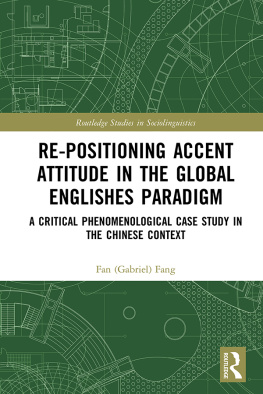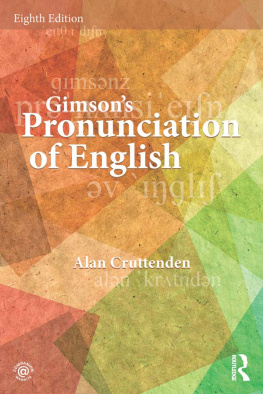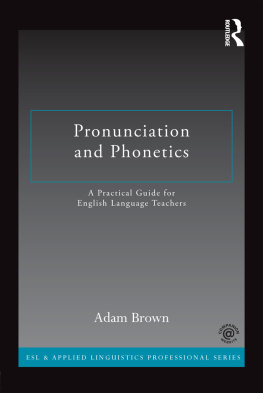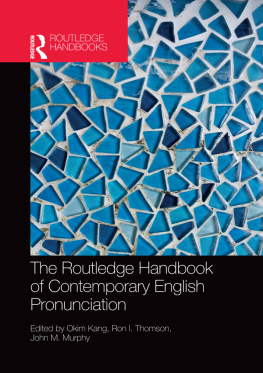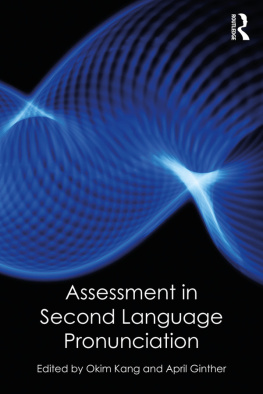Re-Positioning Accent Attitude in the Global Englishes Paradigm
This book revisits the issue of China English as a developing variety of English and scrutinises students and teachers attitudes towards their own and other English accents from the critical phenomenological perspective of Global Englishes (GE) in the Chinese context. The research contributes to the field of GE by proposing a model of pronunciation teaching called ToPIC (Teaching of Pronunciation for Intercultural Communication) informed by interculturally responsive language pedagogy. Combining theory and empirical data, the book presents ground-breaking research on accent attitudes in the Chinese context within the GE paradigm and raises issues and concerns regarding teaching English, particularly speaking and pronunciation, from the GE perspective. Unpacking attitudes towards English accents from a critical perspective, this book will both show policy makers the need to consider the impacts of GE and help practitioners and language learners re-evaluate the goals and needs of English learning. The ToPIC approach also has significance for curriculum reform as it readdresses various issues in language policy and practice. The ToPIC approach is recommended for those interested in teaching and learning English in the expanding circle context and those seeking to learn more about learning and using English across the world.
Fan (Gabriel) Fang obtained his PhD from the Centre for Global Englishes, University of Southampton, UK. He is currently Associate Professor at Shantou University, China, and Distinguished Adjunct Professor of King Abdulaziz University, Jeddah, Saudi Arabia. His research interests include Global Englishes, language attitude, identity, intercultural communication, and ELT. His has published articles in journals including Asia Pacific Journal of Education, Asian Englishes, ELT Journal, English Today, Language Teaching Research, System, The Asian Journal of Applied Linguistics, and The Journal of Asia TEFL. He recently completed a British Council funded project (led by Dr Will Baker) investigating the development of intercultural citizenship and its relationship to English language use among Chinese students in the UK. His latest volume (co-edited with Dr Handoyo Puji Widodo) Critical Perspectives on Global Englishes in Asia: Language Policy, Curriculum, Pedagogy and Assessment was published in 2019.
Routledge Studies in Sociolinguistics
Emerging Hispanicized English in the Nuevo New South
Language Variation in a Triethnic Community
Erin Callahan
Racialization and Language
Interdisciplinary Perspectives from Peru
Edited by Michele Back and Virginia Zavala
Discourses of Identity in Liminal Places and Spaces
Edited by Roberta Piazza
Language Policy in Superdiverse Indonesia
Subhan Zein
Re-Positioning Accent Attitude in the Global Englishes Paradigm
A Critical Phenomenological Case Study in the Chinese Context
Fan (Gabriel) Fang
Revivals, Nationalism, and Linguistic Discrimination
Threatening Languages
Kara Fleming and Umberto Ansaldo
Crosslinguistic Influence in Singapore English
Linguistic and Social Aspects
Ming Chew Teo
Chinese-English Interpreting and Intercultural Communication
Jim Hlavac and Zhichang Xu
Ageing Identities and Womens Everyday Talk in a Hair Salon
Rachel Heinrichsmeier
Linguistic Mitigation in English and Spanish
How Speakers Attenuate Expressions
Nydia Flores-Ferrn
For more information about this series, please visit https://www.routledge.com/Routledge-Studies-in-Sociolinguistics/book-series/RSSL
First published 2020
by Routledge
2 Park Square, Milton Park, Abingdon, Oxon OX14 4RN
and by Routledge
52 Vanderbilt Avenue, New York, NY 10017
Routledge is an imprint of the Taylor & Francis Group, an informa business
2020 Fan (Gabriel) Fang
The right of Fan (Gabriel) Fang to be identified as author of this work has been asserted by him in accordance with sections 77 and 78 of the Copyright, Designs and Patents Act 1988.
All rights reserved. No part of this book may be reprinted or reproduced or utilised in any form or by any electronic, mechanical, or other means, now known or hereafter invented, including photocopying and recording, or in any information storage or retrieval system, without permission in writing from the publishers.
Trademark notice: Product or corporate names may be trademarks or registered trademarks, and are used only for identification and explanation without intent to infringe.
British Library Cataloguing-in-Publication Data
A catalogue record for this book is available from the British Library
Library of Congress Cataloging-in-Publication Data
Names: Fang, Fan, 1984- author.
Title: Re-positioning accent attitude in the global Englishes paradigm : a critical phenomenological case study in the Chinese context / Fan (Gabriel) Fang.
Other titles: Repositioning accent attitude in the global Englishes paradigm
Description: First. | New York : Routledge, 2019. |
Series: Routledge studies in sociolinguistics | Includes bibliographical references and index.
Identifiers: LCCN 2019033585 (print) | LCCN 2019033586 (ebook) | ISBN 9781138480971 (hardback) | ISBN 9781351061308 (ebook)
Subjects: LCSH: English language--Study and teachingChina. | English language--Study and teaching--Foreign speakers. | English language--Pronunciation by foreign speakers. | English language--Social aspects--China.
Classification: LCC PE1068.C5 F36 2019 (print) | LCC PE1068.C5 (ebook) | DDC 427/.951--dc23
LC record available at https://lccn.loc.gov/2019033585
LC ebook record available at https://lccn.loc.gov/2019033586
ISBN: 978-1-138-48097-1 (hbk)
ISBN: 978-1-351-06130-8 (ebk)
To Sophie, Hugo and Francisca
Figures
Tables
It is both ironic and relevant that I am reading this monograph while travelling within China. And as I write this foreword, I am in the former Chinese capital of Nanjing, having spent the previous week in the current capital of Beijing. As the high-speed bullet train whisks me from one city to the next, announcements over the system are bilingual, first in Mandarin and then English. At my hotels the Holiday Inn and Sheraton, respectively I surf my television channels for the news. For much of the time, I toggle between BBC and CNN, noticing the news anchors speak in either British or American accents, even though both news outlets have foreign correspondents who report in an Indian English, Filipino English accent, among other things. Within each city, I commute on the modern subway system. Again, announcements are made in both Mandarin and English as the train approaches each station; the English announcements, I observe, have been Anglicized, perhaps in order to allow the non-Chinese speaking commuter to match the pronunciation with the Pinyin version of the stop on the subway map found on the wall.
Accents matter, I am reminded. And this reminder is stark when I notice the huge Disney English poster at the mall where I have my lunch. On the poster is a white male teacher looking caringly at his young Chinese student. Which accent is being taught at the Disney English school on the seventh floor of this mall? I assume that it is an American accent that is used for instruction. The image on the poster literally indexes whiteness and conjures a widely circulated belief of who constitutes an educated speaker of English. The accent is thus the icing on the cake, but, as we all know, how a cake is iced will determine the level of buyer interest. Within the context of this book, which is based on the Global Englishes (GE) paradigm, Fan (Gabriel) Fang alerts us to how the object of purchase, English, is taken up by Chinese university students and teachers as he explores their perceptions of their own English accents and that of ours.

